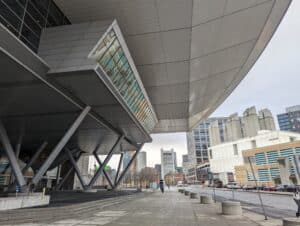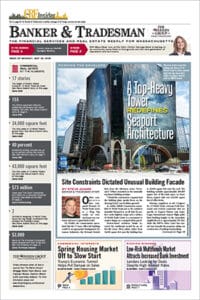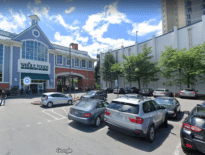
The Boston Convention and Exhibition Center's main entrance on Congress Street. Photo by James Sanna | Banker & Tradesman Staff / file
City officials and a state senator representing South Boston raised concerns Thursday that the independent convention center authority may be planning under “false pretenses” to develop land taken by eminent domain for mixed use rather than convention-related purposes.
Sen. Nick Collins, Boston City Council President Ed Flynn and City Councilor At-Large Michael Flaherty sent a letter to state and city officials on Wednesday in opposition to the Massachusetts Convention Center Authority’s plan to lease for 99 years three parcels of land in South Boston for what they say is not its intended purpose.
After a meeting of the MCCA board on Thursday, a spokesperson for state Administration and Finance Secretary Matt Gorzkowicz also expressed concerns about the process of soliciting development proposals.
The mostly unbuilt 6.2 acres of asphalt along D and E streets across the street from the Boston Convention and Exhibition Center were taken by eminent domain in 2012 and 2013 to expand the convention center industry in the area.
After owning the properties for over a decade, the MCCA opened a 30-day bidding period for the land on the week of Thanksgiving, resulting in only two bidders.
One development proposal filed by the Boston Global Investors firm would build three mixed-use commercial buildings that would include ground floor retail, a grocery store, a green roof for public gathering and urban agriculture, parking spaces and over 40,000 square feet of public open space.
Cronin Development’s proposal also includes three mixed-use buildings on the three land parcels. They propose a gallery focused on Black and brown artists, a performance and lecture space, life sciences labs, an open market area with food vendors, full service grocery store and a parking garage.
Both proposals also include 50,000 square feet of office space for the MCCA.
In the request the MCCA sent out on Nov. 21 to solicit proposals and start the 30-day bidding process, the authority said it was seeking development that “activates the D Street neighborhood through office, commercial, industrial and/or similar uses,” delivers the 50,000 square feet of office space for the authority, fulfills BCEC’s parking needs and includes space dedicated to “community-based uses.”
When asked about the best use of the land for future development, authority spokesperson Philip Crohan referred to the “key elements and features we have identified as necessary.”
Collins said the development proposals didn’t fit the listed purpose for the land taking in the 2012 and 2013 orders of taking, which say the properties should be used for “the expansion, operation, and promotion of convention and exhibition centers” or other facilities “necessary to provide services or accommodations to the public in connection” to the convention market.
“These assets were taken by eminent domain for a particular purpose that is not being executed with an open-ended bid offering,” Collins, Flynn and Flaherty wrote to Administration and Finance Secretary Gorzkowicz and Boston’s Chief Financial Officer Ashley Groffenberger, who sit on the board. “This has given rise to the concern about the MCCA land banking under false pretenses.”
Collins said he believed the properties were intended for, and should still be used for, mid-priced hotels to make BCEC more competitive for mid-priced conventions, rather than just luxury events.
“In addition to making Massachusetts more competitive in the meeting and conventions business by offering different price points, [hotels] would also deliver high-quality, blue collar jobs for a diverse array of area residents,” the South Boston Democrat said.
The MCCA’s request for proposal also says they expect the lease price per year would be “at least” $5 per square foot, which at 6.2 acres, is $1.35 million. In 2012 and 2013 the MCCA paid roughly $51 million for the land, Crohan said. The lease agreement is for a term of 99 years.
“We have heard from previous owners who would like their property returned if the aforementioned public purpose is no longer the driver for the need to own this land,” Collins, Flaherty and Flynn wrote.
The three South Boston politicians urged the MCCA’s board of directors to stop the “unusual and uncompetitive process so that the community and taxpayers can be sure that their assets are handled with integrity.”
The authority board met Thursday to discuss the bids, but members quickly retreated into an executive session. The session was closed to the public under the basis that open discussion of the land rental “could have a detrimental effect on the Authority’s bargaining and negotiation position.”
Shortly after the public meeting was closed for the board to speak privately, Flynn tweeted, “Another example of @MassConvention’s lack of transparency: their board meetings are neither in person nor public. Anyone from the public trying to log in to the meeting right now where a 99-year public land lease is being discussed has been shut out. Time for change! #bospoli.”
Crohan said the authority could not release any details of what was discussed in the executive session.
“The purpose of this function is to avoid any influence or detrimental effect to ongoing or future purchases, exchanges, or leases of property that an open meeting may inflict,” Crohan said. “Because of the very definition and purpose of an executive session, I cannot comment on matters discussed by the committee members after their decision to enter into this portion of the meeting.”
Late Thursday, a Gorzkowicz spokesman reflected the secretary’s concerns.
“The secretary, as a member of the Massachusetts Convention Center Authority board, has expressed concerns to Executive Director Gibbons about the process used in the issuance of the RFP for development of parcels adjacent to the convention center in South Boston, which resulted in just two bidders. He looks forward to hearing more from the director and his fellow board members about potential paths forward,” Gorzkowicz spokesman Matt Murphy said in a statement to the News Service.
Collins was also frustrated by the Thursday meeting, pointing out that the meeting was held over Microsoft Teams, which he said is less accessible than Zoom.
“Not everyone has access to Teams, they should probably be live-streaming it on their website,” he said. “Hybrid is fine but things need to be open to the public.”
Collins newly chairs the Joint Committee on State Administration and Regulatory Oversight, which oversees matters concerning competitive bidding on public contracts as well as open meeting law concerns. He received the appointment on Wednesday.
“Based off of what’s going on with the convention center, there’s clearly a need for reform, and the committee will be looking at that this session,” Collins said.
He also filed a bill (SD 2406) that would require any state or quasi-state agency that takes private property by eminent domain and does not use it for its intended purpose to return the land back to the original owner at the cost at which it was taken.
Nine of the 13 members of the MCCA board are appointed by and “serve at the pleasure of the governor,” and two members are appointed by the mayor of Boston. The two other members are Gorzkowicz and Groffenberger, or a designee for Boston’s CFO.
A spokesperson for Boston Mayor Michelle Wu did not reveal the mayor’s feelings on the matter.
“The Mayor is committed to working with city and state elected officials and community stakeholders to determine the best path forward,” the spokesperson said in a statement.








